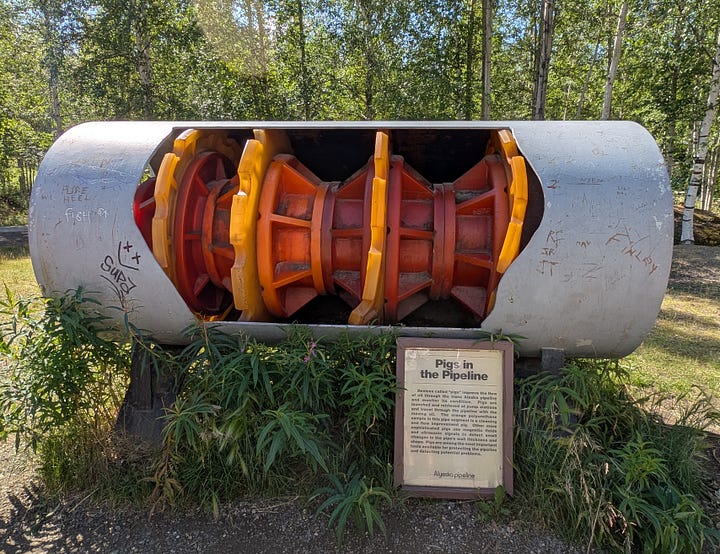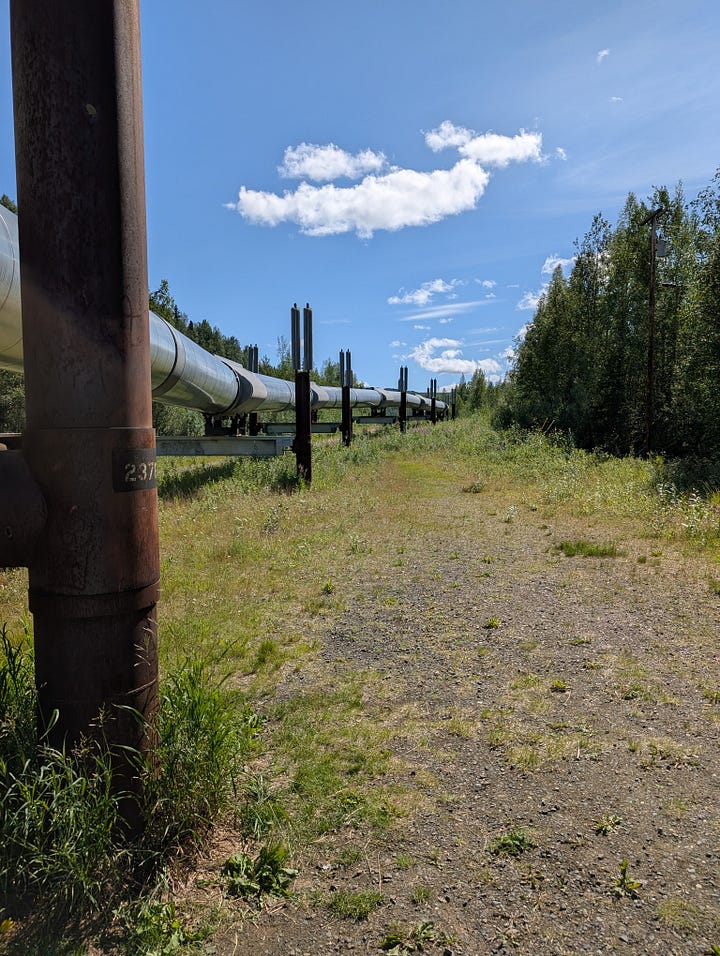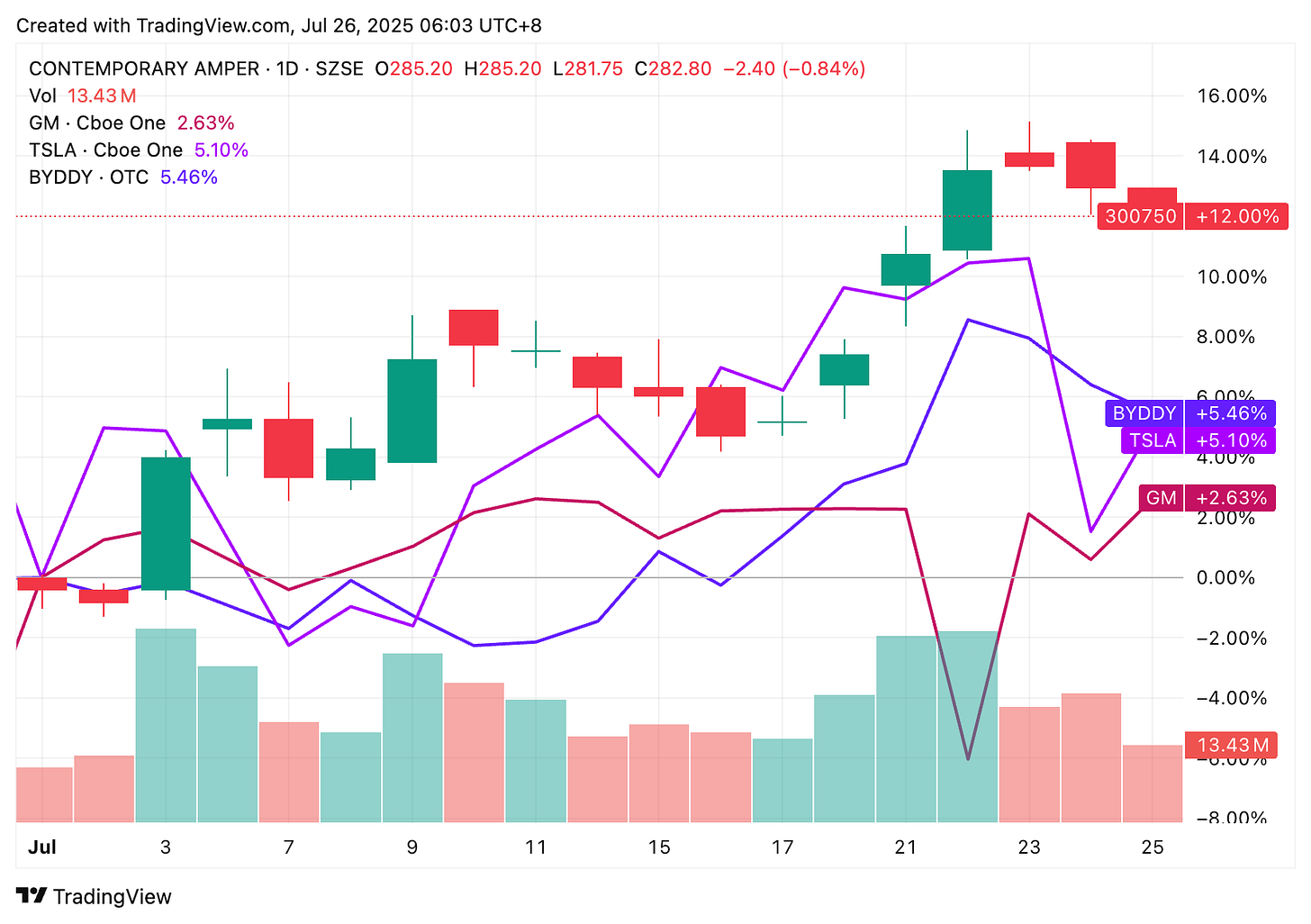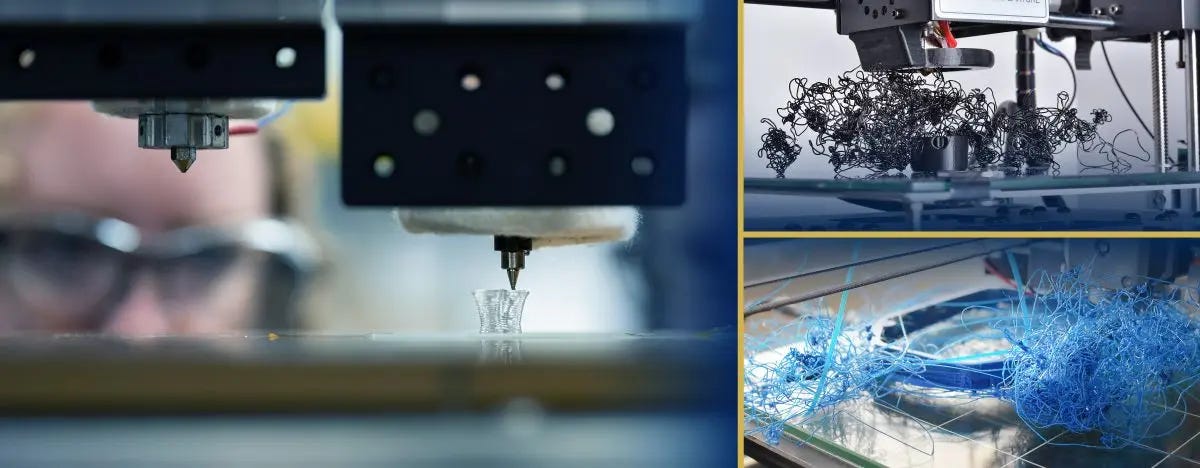Into the Wild Factory Floor
This week: industrial production from Alaska to Outer Space, environmental challenges with PFAS, AI reconstruction of the scientific process, LSTM in resistance spot welding, MaVila 3D printing.
Shop Talk
Capturing this week's zeitgeist
Alaska faces a fundamental challenge: 80% of Alaska is without roads, and an even greater area does not have access to the only power grid in the state, connecting Fairbanks to Anchorage. This geographic isolation affects both oil and critical minerals development, but the processing requirements create different infrastructure needs.
For oil, the Trans-Alaska Pipeline System spans 800 miles from Prudhoe Bay to Valdez, but Alaska has limited local refining capacity. Alaska has only three small refineries - one operated by Andeavor in Kenai processing less than 100,000 barrels per day, and two operated by Petro Star in North Pole and Valdez with combined capacity less than that. The majority of Alaska crude is shipped to refineries near Seattle and Los Angeles for processing.
Unlike oil where pipeline transportation is relatively straightforward, critical minerals require complex separation technologies. Companies like Mariana Minerals are highlighting the need for vertical integration, automation, and a new approach to construction and critical mineral plant operation using AI and machine learning.




Assembly Line
This week's most influential Industry 4.0 media.
🛰️ Space is the new factory floor
✍️ Author: Ariel Ekblaw
Every industrial revolution is defined by its location — think of Manchester’s mills, Detroit’s assembly lines and the remote bubble of Silicon Valley’s R&D labs. The same is true for the next industrial revolution, currently unfolding 250 miles above our heads.
As a factory floor, space offers a set of unique properties. Microgravity assists new assembling habitats that may enable breakthroughs. Pharmaceutical companies have studied protein crystallisation on the International Space Station. SpaceX is exploring in-orbit drug research with its new Starfall programme.
Read more at Financial Times
Additive Manufacturing Enables Advanced Thermal Control Systems for Next-Generation Space Missions /Tech Briefs/
🏞️ Fighting Forever Chemicals and Startup Fatigue
What if we could permanently remove the toxic “forever chemicals” contaminating our water? That’s the driving force behind Michigan-based startup Enspired Solutions, founded by environmental toxicologist Denise Kay and chemical engineer Meng Wang. The duo left corporate consulting in the rearview mirror to take on one of the most pervasive environmental challenges: PFAS.
Read more at MIT Technology Review
IoT’s vital role in monitoring mining’s environmental impact /Mining Technology/ using Narrowband NTN (Nb-NTN), which allows devices to switch between terrestrial and cellular networks, will soon enable autonomous machinery to constantly stay connected in remote areas of the world.
🦾🤖🦿 Humanoid Robots: From the Warehouse to Your House
The beachhead for humanoid robots is semi-structured industrial settings, such as logistics and manufacturing. From there, they will rapidly expand into less structured environments such as grocery and retail stock rooms. After that, they will roam the floors stocking shelves, and out into construction, health care, and the industries that demand greater generality in their perception, intelligence, decision-making, manipulation, locomotion, and navigation. Safety is paramount throughout this evolution and remains the biggest barrier to mass adoption. Ultimately, robots like Digit will enter our homes, but that requires an even higher bar for safety and capability. As one expert put it, "Until you can prove that the robot is not going to fall on a baby, it's not going into the home." The warehouse is our proving ground, our practice arena for achieving that ultimate standard.
Read more at Agility Robotics
EngineAI raises nearly $140M to develop legged, humanoid robots /The Robot Report/
China’s Unitree launches full‑size humanoid at just US$5,900, shocks robot market /Interesting Engineering/ but beware of the pricing terms /Larry on X/ while Benjamin Bolte of K-Scale labs offers a rebuttal /X/
🚗 How Audi uses LSTM in resistance spot welding
Audi has taken quality control of weld spots in body construction to a new level in Neckarsulm.
🖨️🧠 New AI model could revolutionize U.S manufacturing
With support from the U.S. National Science Foundation, a team led by California State University Northridge’s Autonomy Research Center for STEAHM has developed MaVila — short for Manufacturing, Vision and Language — an intelligent assistant that combines image analysis and natural language processing to help manufacturers detect problems, suggest improvements and communicate with machines in real time. Their goal is to create smarter, more adaptive manufacturing systems that can better support one of the most important sectors of the U.S. economy.
Researchers trained MaVila using vast datasets of images paired with descriptive language. Then, they fine-tuned it in a lab setting by showing it pictures of 3D-printed parts with visible flaws, such as blobs, cracks or stringy filaments. In most cases, MaVila correctly identified the defects and suggested better printing settings.
The team also connected MaVila to mobile devices and robotic simulations. This allowed the model to operate in real-time scenarios, such as identifying a machine from a photo and generating step-by-step commands to adjust performance or fix a flaw — something that traditionally requires expert programming.
Read more at National Science Foundation
A smarter approach to designing metamaterials /Berkeley Engineering/ with a new AI-driven framework that can more efficiently design 3D truss metamaterials — a type of structure with extraordinary mechanical properties, sound absorption capabilities and tunability — while minimizing their sensitivity to defects.
Model-based generation of manufacturing process plans through on-the-fly topology formation /Computers & Industrial Engineering/
Process parameters optimization for minimizing warpage and cycle time using vibration-assisted plastic injection molding /The International Journal of Advanced Manufacturing Technology/
New Product Introduction
Highlighting new and innovative facilities, processes, products, and services
FibreCoat develops radar-absorbing fiber-reinforced composite
✍️ Author: Grace Niels
FibreCoat announces the development of a fiber-reinforced composite material capable of making aircraft, tanks and spacecraft invisible to radar. Notably, the technology can be used in all of the ways FibreCoat’s existing materials can be used — not just for military stealth, but to cover batteries and protect drivers in electric vehicles, reduce interference and cross-talk for aircraft and spacecraft, for construction applications and so on — providing manufacturers more design freedom.
Read more at Composites World
Covestro launches advanced flame-retardant encapsulation foam for EV batteries /Covestro/
Injection Foaming Tech Reduces Density, Increases Mechanical Properties /Plastics Technology/
Air Liquide strengthens its Advanced Materials Leadership with a new Molybdenum manufacturing plant in South Korea to support next-generation semiconductors
Air Liquide has successfully started up a new plant in Hwaseong, Gyeonggi Province, South Korea. This Molybdenum manufacturing plant, the largest in the world, will supply leading semiconductor customers with its breakthrough advanced materials offer SubleemTM. The offer includes a portfolio of ultra-high purity molybdenum molecules and first-of-its-kind proprietary distribution systems. With this strategic investment, Air Liquide confirms its technological leadership by being the first to supply molybdenum solutions to its customers in large volumes.
Read more at Air Liquide
Investor-backed developer, California Forever, circles rural California county for advanced materials manufacturing hub /Manufacturing Dive/

Business Transactions
This week's top funding events, acquisitions, and partnerships across industrial value chains.
🇩🇪 Makersite Raises €60M in Series B
Makersite has secured €60 million in Series B funding to accelerate its mission of creating a world where every product manufactured is the most affordable, safe, and green it can be through intelligent automation, deep product knowledge and integrations. The round was co-led by Lightrock and Partech, and joined by SE Ventures. All of Makersite’s Series A investors – including Hitachi Ventures, KOMPAS VC, Translink Capital, and Planet A – participated in the round.
Makersite’s AI-powered platform helps manufacturers gain a deeper understanding of what is in their supply chains, starting with fixing product data. The platform takes fragmented and inconsistent customer data and uses artificial intelligence to clean, connect, and structure it. This enriched data is then combined with Makersite’s proprietary data foundation—one of the most comprehensive sources of supply chain information available today. It includes details on how materials and components are made, their cost, environmental footprint, regulatory status, and more.
Read more at Makersite
🇺🇸 Radical AI announces $55M in new funding
Radical AI is building scientific intelligence which will autonomously discover, create, and manufacture next-generation materials to unlock the technologies of the future. We are announcing the close of a $55M seed round to continue this mission. This is the necessary first step in what will be a multi-decade pursuit: the complete reconstruction of the scientific process. Every dollar of this is a commitment to build the intelligence we have described and to pursue the foundational discoveries that will follow. This is the first step in a long and relentless journey.
Read more at Radical AI
Swinburne University of Technology has received $4 million funding from Australia’s Economic Accelerator (AEA) Innovate program for two innovative projects, focusing on scaling up sovereign powder manufacturing and using space particles to improve critical mineral discovery. /Manufacturers' Monthly/
🇺🇸 Nexxa.ai Raises $4.4M to Bring Specialized AI to Heavy Industries
Nexxa.ai, an AI-native company working to transform how industrial engineers operate in digital environments, today announced a $4.4 million pre-seed funding round. The round was driven by a16z speedrun with participation from institutional investors Augment Ventures, Propeller Ventures, Plug and Play, Beat Ventures, SBI, Untapped Ventures, and Cross Atlantic Angels as well as angel investors Rick Berry and Pat McCarthy, among others. The funds will be used to grow the company's engineering resources and expand into more industries.
Nexxa deploys specialized AI agents that integrate with their customers' existing software like engineering tools or estimating systems. Nexxa's AI agents understand the industrial engineering context and act autonomously or collaboratively – accelerating work without requiring any rip and replace.
Read more at PR Newswire
Want more? Check out the paid analysis delivered weekly below 👇



